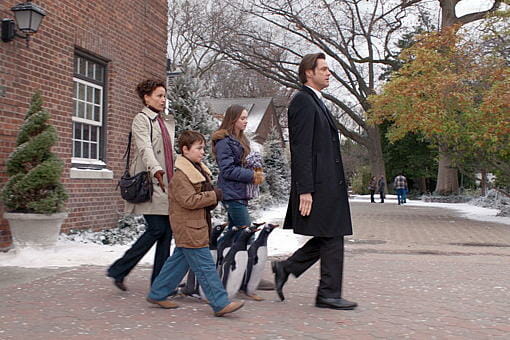By Pam Glazier · June 20, 2011

Jim Carrey made this movie enjoyable. He even made me forget any annoying sub-par performances he may have previously delivered with this new character. It’s similar to what we’ve seen from him before, but enjoyable nonetheless. He’s jerky yet loveable, funny and put-upon—he’s the perfect leading man for a fluffy family comedy such as this. With a performance somewhere between Liar Liar and The Truman Show, if you’re a Carrey fan, you should like this film despite some of the overly G-rated schmaltz.
But enough of that, to the film! Mr. Popper’s Penguins, based on the award-winning and much beloved children’s book of the same title, is the story of a man overcoming his own defense mechanisms. As a child, Tom Popper (Jim Carrey) rarely saw his adventurer father. Instead, he communicated with him through long-distance radio. Thirty years later, Tom is a powerful real estate broker in New York, divorced, with two kids. It's clear that he has intimacy issues when we see him fail to connect emotionally with his daughter Janie (Madeline Carroll), and when his ex-wife Amanda (Carla Gugino) explains that her new boyfriend is emotionally open with his feelings. Despite these issues, Tom’s life is well controlled. He has a swanky apartment, money, and everything is “great."
That changes when his father passes away in Antarctica and wills him a penguin. Tom’s life is thrown into chaos, especially once five more arrive via airmail, but he decides to keep them when his son Billy (Maxwell Perry Cotton) enthusiastically assumes they are a birthday present. And here is where the healing starts. We’ve got all the ingredients—the broken family, the life-hardened dad who couldn’t make it work, and the adorable animals that will show them how to love—we just have to let them simmer a bit. And that is what happens, very cutely, for the rest of the film.
Tom Popper’s personal growth is well engineered because the writers showed it externally through changes in all of the main aspects of his life. We see what goes on with his family, his work, and when he’s alone. The penguins are the catalyst that make life uncomfortable for him. He is late for important work meetings, he can’t sleep from all the honking birds, and he has to deal with his kids because they are now with him more often in order to see the penguins—this leads to further interaction with his difficult ex-wife. All of these events coalesce so that once he has his change of heart, it is believable and a triumph for both him and the audience because we’ve suffered through it all with him. That is screenwriting structure at work. Complex, seemingly unconnected events woven together to create a narrative that exhibits growth. All the main points that create this effect were precisely chosen and placed. This is why things seem to naturally unfold the way they do, as opposed to forced surprise moments.
Of course, the evil zoo keeper Nat Jones (Clarke Gregg) seems a bit like a lazy MacGuffin (i.e., plot enabling device) that didn’t really need to be there. And the same goes for the real estate meetings with Mrs. Van Gundy (Angela Lansbbury), but they work for a family audience none the less. Were some of those moments clichéd? Sure, but this ain’t The Bicycle Thief. This is fluff, and as fluff goes, this was good fluffy family fun all the way.